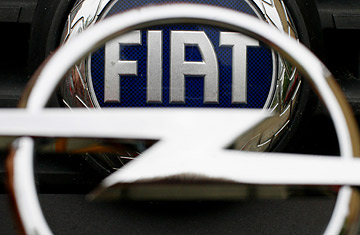
The Opel and Fiat logos
Fiat is the perennial also-ran of European auto companies. The carmaker that put Italy on the road after World War II has spent the past few decades churning out small, affordable vehicles that are too often plagued by reliability problems. Like Chrysler, the ailing U.S. automaker Fiat most resembles, the company (which also owns Alfa Romeo and Lancia) has been on a performance roller coaster, especially since Italy's car market opened up to greater competition in the early '90s. Long periods of slumping performance that threatened the firm's existence have been interspersed by occasional hit new models that help Fiat live on for another few years.
Now the firm is making a play for the majors. Just a few days after agreeing to a deal for a 20% stake in Chrysler, Fiat says it wants to buy General Motors' European operations. Fiat's chief executive, Sergio Marchionne, was in Germany on Monday to talk with German officials including Economics Minister Karl-Theodor zu Guttenberg. The Italian-born, Canadian-raised Marchionne, who many credit with rescuing the Italian firm over the past few years, told the Financial Times that a tie-up between Fiat and Opel, General Motors' main European marque, would be a "marriage made in heaven." (See the 50 worst cars of all time.)
Crucially, a combined Fiat, Opel and Chrysler would have annual sales of some 5.5 million units. Marchionne has said in the past that automakers need to sell at least 5 million vehicles a year to succeed and that only three or four large-scale automakers would survive the next few years. Buying Opel would give Fiat scale and turn it from becoming a takeover target itself into one of the world's biggest carmakers.
Why now? The most obvious answer is, because it can. Marchionne is widely credited with revamping Fiat's corporate culture and vehicle lineup. By sweeping away a bloated upper management, introducing stylish new cars and focusing on fuel efficiency, always a company strongpoint, Fiat has enjoyed robust profitability in recent years. In 2005, just as it was emerging from a prolonged slump, it also pocketed $2 billion in cash by forcing General Motors, with which it had a joint-operating agreement, to either buy the Italian company under the terms of their deal or pay up to walk away altogether. GM paid up.
Now it's GM that finds itself in dire straits. The U.S. auto giant has received more than $15 billion in loans from Washington, announced mass layoffs and ditched its Pontiac brand. Executives at Opel have said they need more than $4 billion to get through the current economic slump; the German government says the firm should find an investor, because Berlin is unlikely to pony up any cash. (See the most important cars of all time.)
There's no guarantee that Fiat will win Opel, of course. GM Europe concedes that it is in talks with "several possible investors." Canadian car-parts maker Magna International has expressed interest, while Russian carmaker GAZ, Singaporean and Middle Eastern sovereign wealth funds and U.S.-based private equity firm Cerberus have all at various times been mentioned as possible buyers. And even if Fiat emerged as the likeliest suitor, Germany's unions could still stop any deal, especially with German elections looming in the fall. Then there's that tricky issue of how to make a combined company work together; the auto industry is full of failed mergers.
There's another reason that Fiat's in such an expansive mood. Despite the fact that it has been on a roll, the Italian company may need these deals as much as GM and Chrysler. The car market has collapsed in Italy over the past few months — as is the case elsewhere — and Fiat continues to cut jobs. One industry insider says the downsizing in recent years, while good for the bottom line in the short term, has left the firm depleted in some divisions. If Marchionne believes that only the big will survive, some of his bold plays will have to come off.
— With reporting by Jeff Israely
